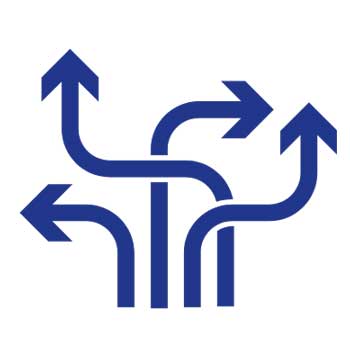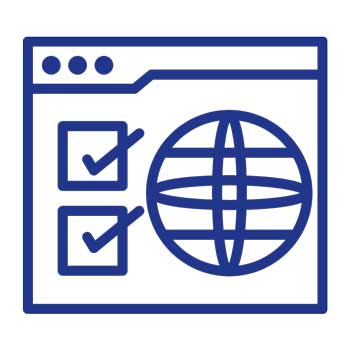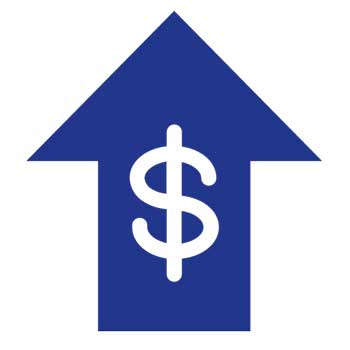What are the minimum domain names you need to register for a business? Are the upsells offered by domain registration companies worth it? In this post we look at tips & tricks to help you manage your domain names – no matter if you are a domain name minimalist or a hoarder.
There are two extreme types of business owners when it comes to domain names.
The domain name minimalists own the domain name that they are trading under, and that’s it.
Then you have domain name collectors. They have a collection of domain names, often scattered across a number of domain name registrars.
Their list of domain names are like a scrapbook of past business brands, possible ideas of the future, and 4 billion variations of their business name (.net.au, .net, throwing a the in front of the name etc). It is like a stack of half-finished craft projects, or hundreds of unread magazines they will get back to one day.
Both extremes have their strengths and challenges with their approach to their domain names.
Domain Name Minimalists – The Essential Domain Names Every Business Should Own
The business owner who just owns their current business domain name and that’s it, is possibly leaving themselves open to security and brand risks.
All business owners need to own the following domain names:
- Their current business URL.
- Any domain names that they had in the past that had emails attached to them.
- The full trading names of their businesses. (e.g. My website URL is heartcomms.com.au, but I also own heartharmonycommunications.com.au and have it redirecting to the main website).
- The name of the business owner. In most cases you can have it redirect to your main website, but you can also have it as a landing page with links to your social media presences as a way of rounding up your online presence and creating a personal brand).
- The .com version of their .com.au brand name (if you can get it.)

Domain Name Collectors
Most of my clients tend to be domain name collectors, but some of my collectors have taken an acute turn and are card carrying members of Domain Name Hoarder’s Anonymous.
The domain name collectors (… cough hoarders) tend to have their own security issues.
Often they have bought names from different registrars over the years which means they can lose track of what is registered where.
If they have changed their email or other addresses, they often don’t update their details with the different registrars. When renewal time comes around, and the credit card they have on file has a new expiry date so can’t be processed, the email renewal notices go into an online black hole. This means that the domains end up lapsing and the person loses their website and control of their brand.
I also see collectors often have 2 or three different accounts with the one registrar. This can happen because they set them up using different emails or different iterations of the business name.
Depending on the host, you may be able to merge your separate accounts when you contact their customer service team. However, you may also need to go through a formal transfer of ownership if there are different ABNs or company details.
I also see many domain name collectors with a dusty trail of abandoned and broken websites behind them. Each one is a potential open invitation to hackers and spammers.
Part of the tidy up process we go through with many of our website design clients is to work through and correctly trash all the online debris of past online adventures, get the good domain names rounded up and pointed in the right direction and then let the domain names that are no longer needed lapse into oblivion.
Tips for Domain Name Collectors
- Find where you have registered all your domain names and log into your accounts and update all your details.
- Review your list of names to see if you still need to keep them or if their time has passed. Remember, if you ever had emails linked to that domain name, you get to keep that domain name for life!
- Take a seriously long look at all the domain names you bought because you were scared into trying to brand-protect yourself. Is anyone seriously going to try and trade under the same name as your established business using a .net.au domain name? Really?
- Click on each domain name you have registered to see where it takes you. If it leads to a broken site, you need to tidy up your online presence.
- Choose one quality registrar as your domain name registrar of choice. Good options are GoDaddy, Google Domains and Namecheap.
- Transfer all of the domain names you are keeping to your one registrar of choice. Depending on the registrar, there may be a fee involved for the transfer – but it is worth it! (Check first that you don’t have any special DNS settings (the bits that point to your emails or your hosting) in your current accounts that you need to bring over to your new host.

General Domain Name Registration Rules
- Use a quality domain name registrar.
- Know where your domain names are registered and how to access them at all times.
- Check that your domain names are registered to your details and not your web designer (Check out Domain Name Horror Stories for how to recover your domain name if your designer made a mistake).
- Register for 1-2 years and not longer. It’s easier to keep track of more frequent bills than bills once every 5-10 years.
- Set up auto-renew for mission critical domain names (but remember to update your credit card details when you get a new expiry date on your card).
- Keep your domain name contact details current at all times.
- Don’t use a person’s email for domain name contacts – use a generic company, one in case the person leaves. (e.g. don’t use marysmith@yourdomainemail use admin@yourdomainemail).
- Don’t use a free email address as your registration email (e.g. Yahoo) as some free services cancel email accounts that aren’t often used.
- Don’t use an internet provider email address as your registration email (e.g. Bigpond.com; optus.net.au) in case you change internet providers.
- Set up dual factor authentication with your domain name registrar if they offer it.
- Set up a domain lock with your registrar to stop your domains being transferred out without your knowledge.
- Plan for historical domain name transitions if your business is bought or sold.
- Set up a Google alert to monitor mentions of your company name (and all of its variations) in case the content is scraped and turned into a zombie. This isn’t foolproof but every bit helps.
- Move all emails off your hosting. Use G-Suite or Office365. This is not strictly to do with domain names, but has security implications.
A Word About Domain Privacy
When you go to register or renew your domain name, you will be bombarded with a boatload of upsells – the online equivalent of “Would you like digital fries with that?”
Most upsells are 100% a waste of money.
The only one I would consider is Domain Privacy, and only then in certain situations.
When you register your domain name, the details of the registrant are sent to an international public database called WHOIS. This database is searchable, and unfortunately is a happy hunting ground for spammers wanting to gather emails and phone numbers.
Enter Domain Privacy. With certain top level domains, you can buy what is known as domain privacy, where your details are hidden in the database.
Great! Let’s all buy that!
Not so fast. In Australia, AUDA (the agency that administers Australian domain names) has mandated that these details must be public and cannot be hidden. Which means that nothing you can do or pay for will see the details hidden for domains that end in .au (.com.au, .net.au etc) or the domains .sydney or .melbourne.
Too many business owners get caught paying for domain privacy for their .com.au domain names, not realising that they are paying for nothing (and all domain registration companies merrily take the money and deliver no service).
Today, go into your domain registration account and turn off the renewals for any domain privacy for your .au domains. You are literally paying for nothing!
However, keep domain privacy for your .com, .co, .store, .website, .blog domains. Those ones will be protected and it is worth doing to stop a few potential spammers in their tracks.

Are Other Domain Name Upsells Worth It?
Some domain name registrars try to sell you a stack of other things when you register or renew your domain names. In most cases, you are paying for nothing and when we review the options in depth with our clients we have often ended up saving them hundreds of dollars in fees each year as they were paying for things they didn’t need or use.
Domain Certification
Read the terms of this carefully. In most cases this is NOT giving you a higher level SSL, it is just them giving you a digital sticker for your site to try and improve trust.
Most online customers totally ignore the digital stickers promoted by domain name registrars, but do look for trust seals like Norton, McAfee Secure or Trustmark). If you want to built trust, go for one of the known brands and not a random sticker from your domain registrar.
Domain Directory Listings
Some registrars promote that they will add you to their online directory (for a fee) or will automatically create listings for you in places like Facebook and Google my Business.
Google hates most online paid directories where you pay to list your business, so there is little SEO benefit from joining their digital desert (sorry directory).
And as for automated online listings, be careful as you may end up with duplicate listings (which Google also hates) and you may not get the login details for those accounts.
I wouldn’t waste my money on these add-ons.
Premium DNS
Some less than fabulous domain name registrars that you would be Crazy to use make you pay extra to do things like redirect your domain name to another URL.
If you are stuck with that registrar for whatever reason, and you can’t set up a redirect through your hosting (usually because they have stopped you from being able to that through your website builder as well unless you pay them more money), then you may need to fork out for Premium DNS … or you could just move all your domain names to a decent registrar that doesn’t charge extra for basic services.
Hosting/Email/SSL Upsells
These are all things you should organise through your hosting or your IT support person and not your domain name registrar.
As a general point, don’t buy your hosting from a domain name registrar, there are much better hosting options on the market like VentraIP, Kinsta or WP Engine.
However, you could buy your domain name from your host IF you like and trust your host and are not intending to move any time soon (and if you are scattered with your paperwork and prefer all your tech in one place).
Website Builders
Two words. Run away!
If you build your site using their builders, you are locked into that provider as your website is not transferable to other hosts. You always want to be able to pick up and move your digital house, and not have to rebuild it each time you want to move hosting providers.

Last Thoughts
Your domain name is one of the most important parts of your brand and your intellectual property.
Avoid the shonks. Say no to upsells. Register the essentials. And, no matter whether you are a minimalist or a collector, remember that you need to be able to access your domain name at all times.
Still struggling with domain names? We can help.




